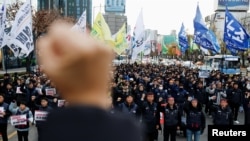Leaders of South Korean President Yoon Suk Yeol’s political party say they will not back a motion by the opposition party to impeach the embattled president over his short-lived attempt to impose martial law.
Han Dong-hun, the leader of the conservative People Power Party, called Yoon’s shock decision this week “unconstitutional” when speaking to reporters Thursday, and said he had asked the president to leave the party.
But both he and Choo Kyung-ho, the PPP’s parliamentary floor leaders, said none of the party’s 108 members will vote on the resolution brought by the Democratic Party.
The impeachment resolution is expected to come up for a vote Saturday. The Democratic Party and its allies hold a huge majority in the 300-seat National Assembly, and need only a few defectors from the PPP to pass the resolution. Eighteen PPP lawmakers who are part of an internal anti-Yoon faction were among the 190 lawmakers who voted to rescind the president’s martial law decree early Wednesday morning, just hours after the announcement.
If Yoon is impeached, he will be suspended from office and replaced by Prime Minister Han Duck-soo. The case will then go to the Constitutional Court, which will decide on whether or not Yoon should remain in office. If he is convicted, new elections will be held within 60 days to replace him.
In a late Tuesday address, Yoon justified his decree by citing the need to eradicate "anti-state forces" and "protect the constitutional democratic order."
Less than six hours later, after the country's parliament overturned the martial law decree, Yoon backed down saying the decree would be lifted and martial law forces withdrawn.
The developments stunned political observers in South Korea, a U.S. ally accustomed to political gridlock but unaccustomed to such drastic measures. It marked the first declaration of martial law in South Korea since the country made the transition to democracy in the 1980s.
The decree — which sought to ban political activities and place media under military control — triggered a frantic response at the unicameral National Assembly.
Shortly after his address, South Korean military forces descended on the legislative compound, with some reportedly arriving by helicopter, according to a VOA reporter on the scene. Security forces attempted to bar entry to lawmakers and others.
Despite minor scuffles at the main gate, opposition lawmakers eventually forced their way inside, with some livestreaming on social media as they climbed over gates and through windows to reach the legislative chambers.
Less than three hours after Yoon's declaration, the lawmakers voted to lift the decree. Under South Korea's constitution, the president is required to comply when a majority of lawmakers vote to overturn martial law.
The presidential office said Thursday that Defense Minister Kim Yong-hyun, who reportedly proposed the idea of martial law to President Yoon, had resigned and would be replaced by retired general Choi Byung Hyuk, who is currently serving as South Korea’s ambassador to Saudi Arabia.
Vice Defense Minister Kim Seon Ho, who is currently serving as acting defense minister, told a parliamentary committee Thursday that Kim Yong-hyun also made the decision to deploy troops to the National Assembly. The Democratic Party has also submitted a resolution to impeach Kim Yong-hyun.
South Korea’s national police said Thursday they were investigating Yoon and Kim Yong-hyun on charges of treason for their roles in the martial law decree. Also under investigation are Army Chief of Staff General Park An-su and Interior Minister Lee Sang-min. Prosecutors have imposed a travel ban on Kim Yong-hyun.
Since taking office in May 2022, Yoon, a former chief prosecutor known for his blunt rhetoric, has faced fierce political battles with the opposition and suffered from persistently low approval ratings.
His critics have seized on corruption allegations involving his wife, Kim Keon-hee, and accused him of mistreating the media. In turn, Yoon has frequently portrayed his critics as North Korea sympathizers and "anti-state" forces.
Yoon's position in the legislature was further weakened in April when the PPP suffered a major defeat in legislative by-elections.
A poll released on Thursday by Realmeter, a Seoul-based public opinion research organization, suggested that 74% of South Koreans support impeaching Yoon over the martial law incident. However, crucially, 50% of conservatives oppose the impeachment, suggesting that Yoon still holds the support of many conservatives.
Protests that began almost immediately after Yoon’s declaration are continuing to expand. A series of activist and civil society groups have called for nightly "candlelight protests" until Yoon resigns. The protests are expected to be biggest on the weekend.






